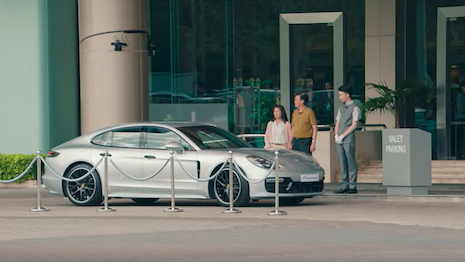- About
- Subscribe Now
- New York,
March 18, 2019

 Porsche topped the ranks for best dealership service experience. Image credit: Porsche
Porsche topped the ranks for best dealership service experience. Image credit: Porsche
Drivers report greater satisfaction with service experiences when dealerships incorporate more digital communications, despite automakers’ delay in harnessing technology.
German automaker Porsche offers the most satisfactory dealership service experience among both luxury and mass-market car brands, according to J.D. Power’s Customer Service Index (CSI) Study. While the luxury average is 862 on a 1,000-point scale, Porsche scored 893.
“Technology needs to be integrated into existing dealer management systems, which can at times present challenges,” said Chris Sutton, vice president of U.S. automotive retail practice at J.D. Power, Costa Mesa, CA. “Even for something as fairly straightforward as getting your car serviced, customers respond well when dealers implement technology into their communication processes.”
J.D. Power’s study, conducted between October and December 2018, is based on a survey of more than 57,000 U.S. owners and lessees of 2016 to 2018 model-year vehicles.
Service satisfaction
This is the first time Porsche has topped the list for dealer service satisfaction in the index’s nearly 40-year history.
The premium automakers rounding out the top five are Lexus, Cadillac, Infiniti and Mercedes-Benz.
J.D. Power’s survey evaluated each automaker on service quality, service initiation, service advisor, service facility and vehicle pick-up, though the categories were not measured equally. Service quality was given the most weight, and counted for 27 percent of the final scores.
Lexus ranked second in dealer service satisfaction. Image credit: Lexus
Open communication is crucial in keeping drivers satisfied, especially during service visits.
When an advisor is focused on the needs of his or her consumer and offers helpful advice, rates of satisfaction are 70 points higher. Keeping customers informed about a vehicle’s status, service history and other details also increases satisfaction by between 30 and 45 points.
Drivers who have all-digital versus all-analog experiences are more pleased by 75 points.
Although the majority of customers still schedule service appointments via the phone, 28 percent prefer online scheduling. This up by 8 percentage points since 2015, illustrating a slow shift towards more digital services.
More than a third of consumers, 34 percent, also prefer to communicate with service advisors and dealerships via text message. Less than 10 percent of communications are done through text message, even though the technology is accessible.
More drivers want to be reached via text message. Image credit: Porsche
Luxury automakers should speed up adoption of digital communications as the satisfaction gap shrinks between franchised dealers and independent service centers.
Since 2017, overall satisfaction with independent facilities improved by 22 points compared to dealerships’ 17 point increase.
“Service quality is absolutely critical,” Mr. Sutton said. “Nothing else matters if the vehicle isn't fixed correctly.”
Dealership experiences
In-store experiences at dealerships and showrooms have been under the microscope after U.S. automaker Tesla, which was not included in J.D. Power’s survey, announced and then scaled back plans to close the majority of its physical locations.
The electric vehicle manufacturer announced this month it is now rerouting its plans back to bricks-and-mortar retail and raising prices instead. While Tesla’s latest reversal may be indicative of continued upheaval within the company, it also hints at the continued and possibly under-appreciated value of physical retail.
Touching on aspects of the retail experience that cannot be replicated online, Tesla’s statement reiterated that its vehicles will remain available for test drives at a prospect’s request and a limited inventory of vehicles are in stock for buyers who do not want to wait for a custom order (see story).
Although the automotive industry has seen an evolution in digital strategies, in-person experiences remain essential for affluent drivers.
According to a recent report from Cox Automotive and Automotive News, brand perception, product range and customer loyalty are among the factors that can have a positive or negative impact on a dealer. Those rankings found that Mercedes-Benz and its dealerships have an advantage over other luxury carmakers when it comes to successfully managing brand attributes that impact dealer performance (see story).
“Dealers are in the best position to understand their specific markets, and how to tailor the amenities and services they offer to meet their customers’ wants and needs,” J.D. Power’s Mr. Sutton said. “Customers appreciate things they can connect to within their own market.”
Share your thoughts. Click here